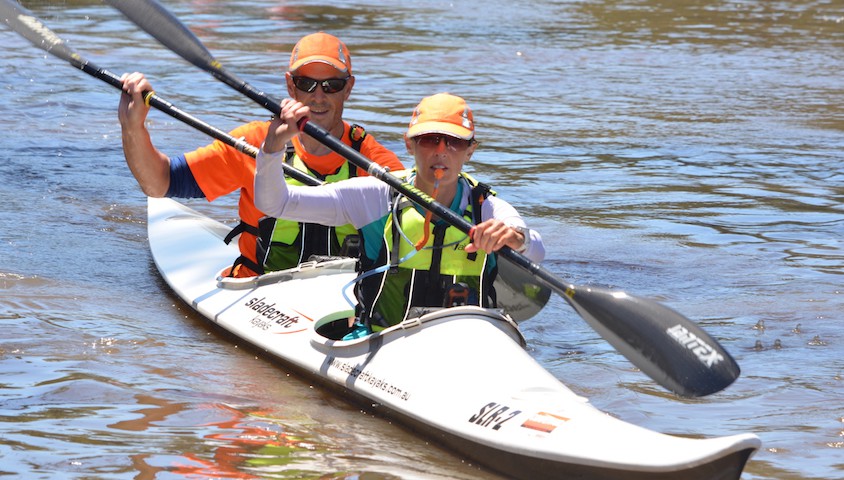A heat wave, an overnight downpour and havoc-wreaking winds couldn’t put a damper on the 2016 Massive Murray Paddle, which finished in perfect conditions to music and cheering crowds in Swan Hill last Friday afternoon.
Organisers and participants declared the 48th running of the event a success, in what was a pivotal year for the event’s future with numbers recovering from last year’s all-time low.
Formerly known as the Murray River Marathon, the five-day, 404-kilometre paddle between Yarrawonga and Swan Hill saw 340 people from 85 teams battle sweltering conditions on day one, when temperatures soared into the high 30s.
Heavy rain in the lead up to the event forced road closures along a section of the course, cancelling the planned day two paddle from Tocumwal to Picnic Point, with paddlers instead repeating the day one leg from Yarrawonga.
Late on day three, choppy water and blustery conditions caused numerous capsizes with some paddlers requiring rescue as they fought their way into the port of Echuca.
All told, $102,642 was raised for charity and community services across Australia by participants. For the first time in the event’s history teams were able to choose where their fundraising efforts went.
In It to Win It

A winning pair: Steve and Kate Dawson were first to the finish line in this year’s Massive Murray Paddle.
While new organiser Shannon O’Brien tried to shift the event’s focus from an endurance race to a social paddle, many paddlers still pushed hard for line honours, with Kiwi husband and wife team Steve and Kate Dawson finishing first in each of the five days to record the overall win.
Speaking post-race, Steve Dawson said their first-time Murray paddle was the fulfilment of a promise made to the late Sydney kayakers Joan and Bruce Morison, who paddled the event many times.
“They always wanted us to do it. They really loved this race and always told us to come here,” Dawson said, while remarking on the great spirit and friendly rivalry the event promoted.
Adele Walker recorded the fastest time in the ladies singles, with Kristian Parkhill taking the men’s individual title; Blue Mountains Grammar School took out line honours in the schools M730 category and also raised over $7000 to reinvest into the school; and first-timers Bacchus Marsh Grammar School won the Nyerna Trophy, awarded to the school that best exemplifies the spirit of the event.
Shannon O’Brien presented the Dhungalla Award to Team Shuzoku, which, he said, is handed to the team who “best expresses the paddle’s tag line of ‘Connecting people, river and country’.”
2016 also saw the youngest ever full-distance paddler, with 14 year-old Tyler Creed crossing the finished line in a Pink Panther-themed C2 and accompanied by his father, Gary Creed.
Clear and Credible Revival
The Massive Murray Paddle was started in 1969 by 21-year-old Mark Thornthwaite, as a fundraiser for the Red Cross.
The founder returned this year to paddle as part of the Blue Mountains Grammar School team, and also to present the award named in his honour to the individual or team that raised the most funds.
Swan Hill’s Greg Roberts accepted the Mark Thornthwaite award after raising more than $19,000 for Swan Hill Men’s Health.
With numbers of participants on the increase this year, Roberts thanked O’Brien for “taking up the challenge” of reviving the paddle.
As well as many first-timers, familiar faces were also found scattered throughout.
Michael ‘Mad Mick’ Dinkgreve paddled a kayak he made himself entirely from Colorbond steel, which he powered by regular snacks of white bread sandwiches and cans of Coke.
Mad Mick completed the entire distance, despite being dramatically capsized by a race official’s boat seconds before the start of day three at Picnic Point.
Meanwhile, Tasmanian team ‘Tassie Old Devils’ competed in a Canadian-style canoe hand carved from native Tasmanian wood.
Getting the Band Back Together
The largest and most visible team was Dungulayin Mileka, known as ‘Blues and Brothers’, an 85-strong team made up of at-risk Victorian Aboriginal youth and local police officers.
Dungulayin Mileka team coordinator Tony Lovett said the purpose of the group was about getting young people and police to communicate.
“It’s not just about being in a boat on the river, it’s about the downtime on the riverbank,” Lovett said. “At the end of the event we can say, ‘you know what? We’ve just done 400 kilometres together. Then when you meet up on the streets communication is easy.’”
O’Brien, who also runs Sydney Harbour Kayaks and Mirage Sea Kayaks, paid tribute to the many volunteers and sponsors who helped make the Massive Murray Paddle happen, and vowed to restore the event to what it once was.
“We want this event to enhance the leadership qualities in our kids, we want to respect the river and we want to bring communities together,” O’Brien said.
UPDATE: The spelling of Bruce and Joan Morison has been corrected.


